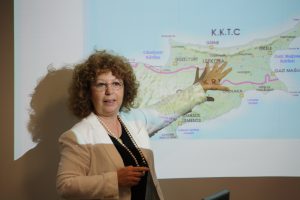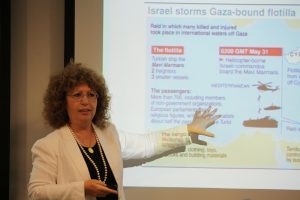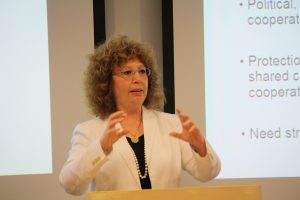Venue
Start
End
Time
20 September 2017, Wednesday, 3.30pm–5pm
Regional Cooperation in the Mediterranean Sea: Lessons for the South China Sea?
Seminar Room 5-2, Level 5, Block B, NUS Bukit Timah Campus
469 Bukit Timah Road, Singapore 259756
(Admission is free of charge but registration is required)
INTRODUCTION
The Mediterranean Sea is one of the most densely populated and used seas: it is bordered by 22 states, and the region has a population of over 400 million. Approximately one-third of this population lives in the coastal regions, and some 250 million people (or 55% of the total population) live in the coastal hydrological basins. For centuries the Mediterranean Sea has been the crossroads for international trade, a maritime tradition that continues today. The Mediterranean Sea is also a hotspot for biological diversity. Yet it supports one of the busiest maritime routes in the world, with most ships flying non-Mediterranean flags. With some 60% of the maritime trade being tanker-based, accidental and operational oil spills pose serious risks to its fragile marine environment. Fishing is another traditional key activity in the Mediterranean. However, today the majority of Mediterranean commercial fish stock is overexploited and in some cases fully exploited. The Mediterranean Sea region is also a geo-political hotspot with ongoing conflicts and frozen conflicts creating challenges for cooperation. Compounding these multiple pressures on the Mediterranean Sea is the problem of maritime delimitation, where no coastal state is able to establish a full 200 nautical-mile continental shelf or exclusive economic zone without overlap into a neighbour’s potential maritime space. The problem of islands has further exacerbated maritime delimitation and entitlement challenges in certain subregions such as the Aegean Sea. Offshore activities have also added challenges to existing ones. The Mediterranean Sea presents a crowded basin of multiple risks and challenges to the protection of its fragile marine environment. Yet, it has been able to overcome the many areas of discord and cooperate in creating one of the more successful regional governance regime for the protection of the marine environment.
What lessons and guidance can the experience of the Mediterranean Sea region provide for the South China Sea region in promoting cooperation in conservation and protection of its valuable yet threatened marine environment?
SPEAKER
Professor Nilüfer ORAL, Istanbul Bilgi University
Dr Nilüfer Oral is a member of the Law Faculty at Istanbul Bilgi University. She was elected to the United Nations International Law Commission for 2017–21. She is also Distinguished Senior Scholar at the Law of the Sea Institute, University of California Berkeley Law School, and Scholar-In-Residence at the University of Virginia Law School in 2005. She has lectured on several occasions at the Rhodes Academy of Oceans Law and Policy. Dr Oral was elected to the International Union for Conservation of Nature (IUCN) Council for Western Europe (2012–16) and is the IUCN Oceans Focal Point. She serves as Chair of the IUCN Academy on Environmental Law and Co-Chair of the Specialist Group on Oceans, Coasts and Coral Reefs for the IUCN World Commission on Environmental Law. Dr Oral serves as a legal advisor to the Turkish Foreign Ministry on law of the sea and climate change and has participated in the Turkish delegation at the International Maritime Organization and as a negotiator at the climate change negotiations. She has been nominated by the Ministry as a candidate to the United Nations International Law Commission (2017–22). She has also been involved as a legal expert in a number of projects with the Turkish Science Council on marine environmental issues, EU and UNDP. Dr Oral is a member of the Board of Directors of Jon Van Dyke Institute, Richardson School of Law, University of Hawai’i; American Society of International Law; and European Society of International Law. She is the editor of the International Straits of the World series (Brill) and numerous other publications.




